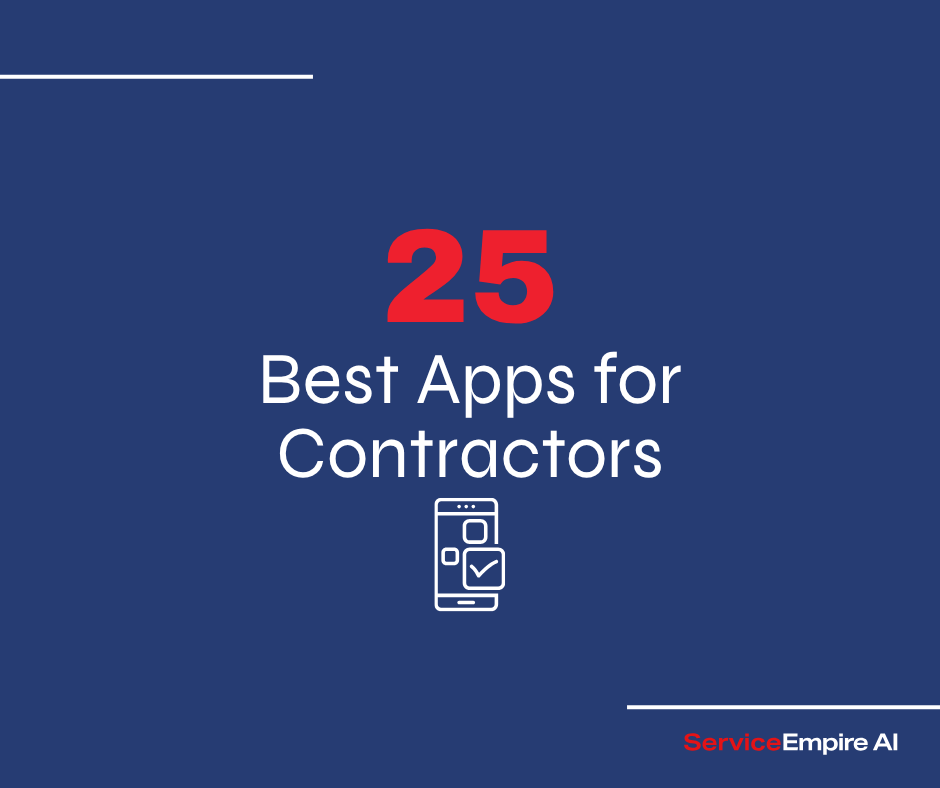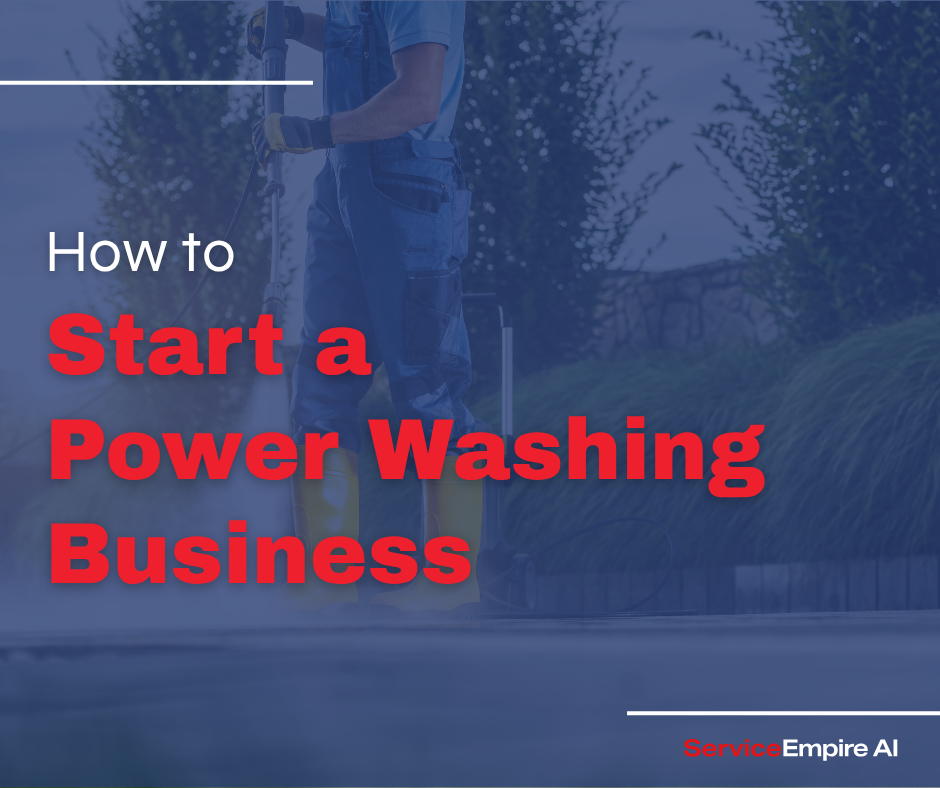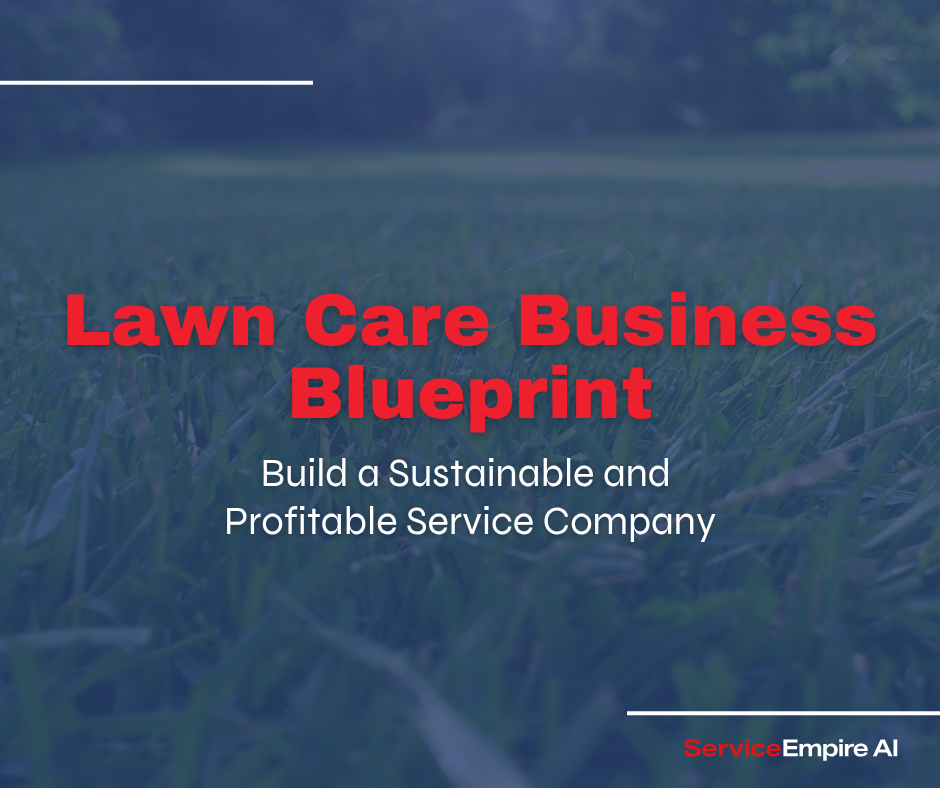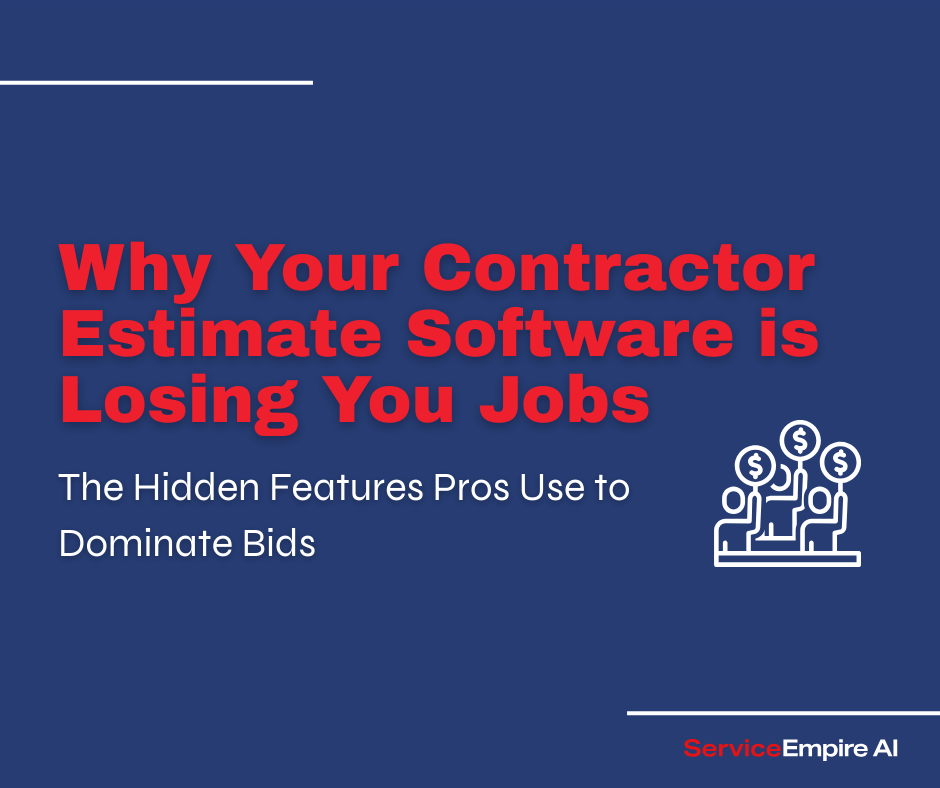
Introduction
Mobile technology has changed the construction industry in a big way. Today, 92% of contractors use smartphones or tablets on the job, according to the 2019-20 JB Knowledge ConTech Report. Instead of using paper, many are now using apps that help them work faster, stay organized, and communicate better. Contractors using mobile tools experience a boost in productivity and spend much less time on paperwork.
Construction has been slower to adopt tech than other industries, but that’s changing fast. New apps for contractors help with everyday tasks like creating estimates, tracking jobs, managing teams, and staying up to date with rules and safety standards. The right contractor apps can make your business run more smoothly, keep clients happy, and increase profits.
This guide breaks down the best mobile apps for contractors—from project management and estimates to scheduling, invoicing, and field service—so you can find the right tools to grow your business.
Why Contractors Need Mobile Apps
The construction industry's mobile nature makes it particularly well-suited to benefit from app-based tools that bring office functionality directly to jobsites and service locations.
Field Mobility Requirements
Contractors spend 60-70% of their working hours outside traditional office settings, making mobile solutions essential for:
- Accessing critical project information on-site
- Documenting work in real-time
- Communicating with clients and team members
- Submitting and approving changes instantly
- Responding to emergencies without returning to the office
Contractors using mobile solutions can respond faster to critical issues and decisions.
Paper Reduction and Documentation Benefits
Digital documentation offers substantial advantages:
- Massive reduction in paperwork administration costs
- Elimination of missing or damaged paper documents
- Searchable digital archives for rapid information retrieval
- Standardized forms ensuring consistent data collection
- Environmental benefits from reduced paper consumption
Solo contractors implementing paperless systems report saving 2+ hours daily on the dreaded paperwork tasks. Larger teams report saving entire salaries by going paperless on administrative tasks.
Real-Time Communication Advantages
Instant communication is a game-changer for project management:
- Reduction in project delay time due to faster problem solving
- Dramatically reduced miscommunication between office and field
- Instant updates on schedule changes or material deliveries
- Improved subcontractor coordination
- Better client communication and satisfaction
Data Accuracy and Error Reduction
Digital tools also improve information quality:
- Reduction in data entry errors
- Elimination of duplicate entries across systems
- Automatic calculations reducing mathematical mistakes
- Standardized data collection ensuring completeness
- Historical data tracking for better estimating and planning
Contractors using mobile apps for documentation report a decrease in change orders resulting from miscommunication or documentation errors.
Essential Categories of Apps for Contractors
Contractors need different types of applications to address specific business functions and challenges. Understanding these categories helps identify the right mix of tools.
App Category Importance Ranking
1. Project Management Apps: Critical for coordinating resources, schedules, and documentation
2. Estimating & Bidding Apps: Essential for accurate proposals and profitability
3. Invoicing & Payment Apps: Directly impact cash flow and financial health
4. Time Tracking & Scheduling Apps: Key for labor management and project planning
5. Field Service Management Apps: Important for service-oriented contractors
6. Document Management Apps: Necessary for contracts, plans, and specifications
7. Safety & Compliance Apps: Critical for risk management and regulatory requirements
8. Material Management Apps: Important for inventory control and procurement
9. Communication Apps: Facilitate team and client interaction
Each contractor's specific needs will determine which categories deserve priority investment based on business focus, team size, and current pain points.
Best Project Management Apps for Contractors
Project management applications serve as the central coordination point for construction projects, connecting office staff, field personnel, clients, and subcontractors.
1. Procore
Key Features:
* Comprehensive project dashboard
* RFI and submittal management
* Drawing and specification management
* Quality and safety tools
* Financial controls including budget tracking
Best For: Medium to large contractors managing multiple complex projects
Pricing: Subscription-based starting at approximately $375/month
Mobile Capabilities: Excellent native iOS and Android apps with offline functionality
2. Buildertrend
Key Features:
* Customer relationship management
* Scheduling and task assignment
* Daily logs and photo documentation
* Client selection management
* Integrated estimating and billing
Best For: Residential builders and remodelers
Pricing: Subscription starting at approximately $99/month
Mobile Capabilities: Strong mobile apps with client portal access
3. CoConstruct
Key Features:
* Single-entry estimating system
* Robust client selection management
* Scheduling and task management
* Photo and file sharing
* Client communication portal
Best For: Custom home builders and remodelers
Pricing: Subscription starting at approximately $99/month
Mobile Capabilities: Full-featured mobile apps for field and client use
4. Monday.com Construction
Key Features:
* Highly customizable workflows
* Visual project tracking
* Team collaboration tools
* Document management
* Timeline and Gantt chart views
Best For: Contractors needing flexible project management
Pricing: Subscription starting at $8/user/month (basic) to $16/user/month (standard)
Mobile Capabilities: Good iOS and Android apps with notification systems
5. Fieldwire
Key Features:
* Plan viewing and markup
* Task management and assignment
* Punch list management
* Form creation and completion
* Photo documentation
Best For: Field-focused project management
Pricing: Free basic plan; Professional plan at $29/user/month
Mobile Capabilities: Excellent offline functionality and plan viewing
Project Management App Comparison
Top Estimating and Bidding Apps
Accurate estimating is key to being profitable in construction and as a landscape architect. Mobile estimating apps bring this critical function to the field.
1. STACK
Key Features:
* Digital takeoff from plans
* Pre-built assembly database
* Customizable materials database
* Professional proposal generation
* Team collaboration on estimates
Best For: General contractors needing comprehensive takeoff and estimating
Pricing: Subscription starting at approximately $1,999/year
Mobile Capabilities: Cloud-based with mobile access to estimates
2. Clear Estimates
Key Features:
* User-friendly interface
* Pre-built templates for common projects
* Customer management
* Proposal generation
* QuickBooks integration
Best For: Residential remodelers and small contractors
Pricing: Subscription starting at approximately $59/month
Mobile Capabilities: Cloud-based system accessible via mobile devices
3. PlanGrid (Autodesk Construction Cloud)
Key Features:
* Blueprint management and markup
* Field measurements and takeoffs
* RFI creation and tracking
* Issue tracking with photos
* As-built creation
Best For: Field-based estimating and project tracking
Pricing: Subscription starting at approximately $39/user/month
Mobile Capabilities: Excellent native mobile apps with offline functionality
4. Esticom
Key Features:
* Cloud-based takeoff and estimating
* Pre-built assemblies and templates
* Material, labor, and equipment databases
* Proposal generation
* Integration with QuickBooks and accounting
Best For: Trade contractors (electrical, mechanical, etc.)
Pricing: Subscription starting at approximately $99/user/month
Mobile Capabilities: Cloud-based system accessible on mobile devices
5. JobFLEX
Key Features:
* Create estimates instantly on-site
* Customizable templates and items
* Photo integration in estimates
* No internet connection required
* Convert estimates to invoices
Best For: Small contractors needing simple, mobile-first estimating
Pricing: Subscription starting at approximately $30/month
Mobile Capabilities: Designed specifically for mobile use with strong offline capabilities
Contractors using mobile estimating apps create estimates faster than traditional methods, plus improvements in accuracy.
Best Invoicing and Payment Apps for Contractors
Efficient invoicing and payment collection directly impact cash flow—a critical factor in contractor success.
1. QuickBooks Online
Key Features:
* Industry-standard accounting system
* Customizable invoices with online payment links
* Expense tracking with receipt scanning
* Basic job costing
* Financial reporting
Best For: Comprehensive financial management
Pricing: Subscription starting at approximately $25/month
Mobile Capabilities: Fully-featured mobile app with invoicing and payment processing
2. Invoice2go
Key Features:
* Professional invoice creation
* Automated payment reminders
* Credit card processing
* Expense tracking
* Simple reporting
Best For: Contractors focused primarily on invoicing
Pricing: Subscription starting at approximately $5.99/month
Mobile Capabilities: Mobile-first design with strong offline capabilities
3. Jobber
Key Features:
* Job scheduling and management
* Quote and invoice creation
* Online client portal for payments
* Automatic follow-ups for unpaid invoices
* QuickBooks integration
Best For: Service contractors billing multiple jobs daily
Pricing: Subscription starting at approximately $69/month
Mobile Capabilities: Comprehensive mobile app for field operations
4. FreshBooks
Key Features:
* Time tracking integrated with invoicing
* Customizable invoice templates
* Multiple payment options for clients
* Expense management
* Project profitability tracking
Best For: Contractors tracking billable time
Pricing: Subscription starting at approximately $15/month
Mobile Capabilities: Full-featured mobile app with time tracking
5. PayPal Business
Key Features:
* Simple invoice creation
* Multiple payment options
* International payment processing
* Low entry barrier
* Widely recognized by clients
Best For: Simple invoicing needs with easy setup
Pricing: Free app with transaction fees (2.9% + $0.30 per transaction)
Mobile Capabilities: User-friendly mobile app
Contractors using digital payment systems report receiving payments faster than those relying on paper invoices and checks. These softwares also have receipt templates automatically built in and automatically sent upon successful payment, a great 2-for-1 beefit.
Time Tracking and Scheduling Apps
Labor management is often the most challenging aspect of contracting businesses. These apps transform how contractors track time and schedule work.
1. ClockShark
Key Features:
* GPS time tracking
* Job and task codes
* Crew management
* Scheduling capabilities
* Payroll integration
Best For: Contractors with field employees and crews
Pricing: Subscription starting at approximately $15/user/month
Mobile Capabilities: Mobile-first design with offline punch-in/out
2. Hubstaff
Key Features:
* GPS tracking with geofencing
* Automatic time tracking
* Project budgeting and limits
* Screenshot monitoring (optional)
* Detailed reporting
Best For: Contractors wanting detailed oversight of remote workers
Pricing: Subscription starting at approximately $7/user/month
Mobile Capabilities: Strong mobile apps with location tracking
3. QuickBooks Time
Key Features:
* Employee time tracking
* GPS tracking and geofencing
* Scheduling and job assignment
* PTO management
* QuickBooks integration
Best For: QuickBooks users needing integrated time tracking
Pricing: Subscription starting at approximately $8/user/month plus base fee
Mobile Capabilities: Full-featured mobile app with offline functionality
4. Connecteam
Key Features:
* Time clock with GPS verification
* Employee scheduling
* Task management
* Forms and checklists
* Employee communication
Best For: All-in-one employee management
Pricing: Free for basic; Premium plans at $29/month for up to 30 users
Mobile Capabilities: Mobile-first platform designed for non-desk employees
5. When I Work
Key Features:
* Shift scheduling
* Team messaging
* Time tracking
* Availability management
* Payroll integration
Best For: Contractors with shifting crew schedules
Pricing: Subscription starting at approximately $2/user/month
Mobile Capabilities: User-friendly mobile app for scheduling and clock-in
Field Service Management Apps
Service-oriented contractors benefit from specialized apps designed for dispatch, service management, and customer tracking. We have an article dedicated to comparing just job management softwares.
1. ServiceTitan
Key Features:
* Scheduling and dispatch
* Customer management with history
* Mobile invoicing
* Inventory tracking
* Marketing automation
Best For: Medium to large service contractors
Pricing: Contact for custom pricing (premium solution)
Mobile Capabilities: Comprehensive mobile app for field technicians
2. Housecall Pro
Key Features:
* Online booking
* Scheduling and dispatch
* Estimating and invoicing
* Payment processing
* Customer communication
Best For: Home service contractors
Pricing: Subscription starting at approximately $49/month
Mobile Capabilities: Strong mobile platform with offline capabilities
3. mHelpDesk
Key Features:
* Work order management
* Scheduling and dispatch
* Estimating and invoicing
* Customer management
* Reporting and analytics
Best For: Small to medium service businesses
Pricing: Subscription starting at approximately $169/month
Mobile Capabilities: Full-featured mobile app for field operations
4. Jobber
Key Features:
* Scheduling and dispatching
* Client relationship management
* Quote and invoice creation
* Client portal
* Route optimization
Best For: Small service contractors
Pricing: Subscription starting at approximately $69/month
Mobile Capabilities: Excellent mobile experience for field teams
5. ServiceM8
Key Features:
* Job scheduling
* Digital job cards
* Checklists and forms
* Photo and note capturing
* Client communication
Best For: Small teams of service technicians
Pricing: Subscription starting at approximately $9/job (with monthly minimum)
Mobile Capabilities: Mobile-first design focused on field use
Document Management Apps for Contractors
Construction requires extensive documentation, from contracts and plans to permits and safety records.
1. Procore
Key Features:
* Centralized document repository
* Drawing management with versioning
* Submittal and RFI tracking
* Photo documentation
* Document sharing with all stakeholders
Best For: Comprehensive project documentation
Pricing: Subscription based on company revenue (enterprise pricing)
Mobile Capabilities: Excellent mobile access to documents with offline capability
2. PlanGrid (Autodesk Construction Cloud)
Key Features:
* Blueprint and specification management
* Drawing markup and annotation
* Issue tracking
* Photo documentation
* Sheet versioning and comparison
Best For: Plan management and field documentation
Pricing: Subscription starting at approximately $39/user/month
Mobile Capabilities: Designed specifically for mobile field use
3. Dropbox Business
Key Features:
* File storage and sharing
* Team collaboration
* Document scanning
* Electronic signatures
* Simple interface
Best For: General document management
Pricing: Subscription starting at approximately $15/user/month
Mobile Capabilities: Strong mobile apps with offline access
4. Box for Construction
Key Features:
* Secure file storage
* Version control
* Automated workflows
* Integration with construction apps
* Advanced security features
Best For: Security-focused document management
Pricing: Subscription starting at approximately $15/user/month
Mobile Capabilities: Good mobile experience with offline access
5. SmartUse
Key Features:
* Blueprint viewing and markup
* Document comparison
* Team collaboration
* Form creation and management
* Plan measurements
Best For: Construction document collaboration
Pricing: Contact for pricing (enterprise solution)
Mobile Capabilities: Tablet-optimized for field use
Safety and Compliance Apps
Safety applications help contractors reduce risk while ensuring regulatory compliance, potentially saving lives while reducing insurance costs. If you just need a simple safety checklist, we have one.
1. SafetyCulture (iAuditor)
Key Features:
* Customizable safety inspection templates
* Digital checklist creation
* Photo capture and annotation
* Issue assignment and tracking
* Analytics and reporting
Best For: Comprehensive safety program management
Pricing: Free limited plan; Premium starting at approximately $19/user/month
Mobile Capabilities: Mobile-first platform designed for field use
2. Safety Reports
Key Features:
* Industry-specific inspection templates
* OSHA compliance tracking
* Corrective action tracking
* Training documentation
* Incident management
Best For: OSHA compliance focus
Pricing: Subscription starting at approximately $85/month
Mobile Capabilities: Strong mobile experience designed for field inspections
3. Safesite
Key Features:
* Safety observations
* Hazard reporting
* Safety meeting management
* Training tracking
* Safety analytics
Best For: Safety culture development
Pricing: Free basic plan; Premium at $499/month for unlimited users
Mobile Capabilities: Mobile-first platform for field safety management
4. Fieldwire Safety
Key Features:
* Safety task management
* Inspection checklists
* Issue tracking and assignment
* Photo documentation
* Integration with project management
Best For: Project-integrated safety management
Pricing: Free basic plan; Professional starting at $29/user/month
Mobile Capabilities: Designed for mobile use on construction sites
5. Certify
Key Features:
* Certification tracking
* License management
* Automatic expiration reminders
* Document storage
* Compliance reporting
Best For: Credential and certification management
Pricing: Subscription starting at approximately $12/user/month
Mobile Capabilities: Mobile access to certification records
Material Management and Ordering Apps
Proper material management reduces waste, prevents delays, and controls costs—critical factors in project profitability.
1. eSUB Materials
Key Features:
* Material tracking by project
* Procurement management
* Delivery scheduling
* Inventory tracking
* Material usage reporting
Best For: Comprehensive material management
Pricing: Contact for pricing (enterprise solution)
Mobile Capabilities: Mobile access to material information and tracking
2. Knowify
Key Features:
* Purchase order management
* Material tracking by job
* Receiving and inventory
* Vendor management
* Budget tracking
Best For: Small to medium contractors
Pricing: Subscription starting at approximately $89/month
Mobile Capabilities: Cloud-based with mobile accessibility
3. BuilderTREND Materials
Key Features:
* Material needs list by project
* Budget tracking
* Vendor management
* Purchase orders
* Cost code allocation
Best For: Residential builders
Pricing: Included with BuilderTREND subscription
Mobile Capabilities: Part of comprehensive mobile application
4. Sortly
Key Features:
* Visual inventory management
* QR code and barcode scanning
* Low stock alerts
* Item history tracking
* Custom fields for materials
Best For: Inventory-focused material management
Pricing: Free limited plan; Premium starting at $39/month
Mobile Capabilities: Mobile-first inventory management app
5. Home Depot Pro App
Key Features:
* Material ordering and reordering
* Order tracking
* Project list management
* Delivery scheduling
* Pro pricing access
Best For: Home Depot customers
Pricing: Free app with Pro Xtra membership
Mobile Capabilities: Designed specifically for mobile ordering
Contractors using material management apps report approximately 15% reduction in material waste, as well as improvements in project material budgeting accuracy.
How to Choose the Right Apps for Your Contracting Business
With hundreds of apps available, selecting the right combination requires a strategic approach.
Business Size Considerations
Match app sophistication to organizational size and complexity:
Small Contractors (1-5 employees):
- Prioritize ease of use and quick implementation
- Focus on core functions: estimating, invoicing, basic project management
- Consider all-in-one solutions to minimize app fragmentation
- Manage budget constraints with entry-level solutions
Medium Contractors (6-20 employees):
- Balance feature depth with usability
- Implement solutions allowing team collaboration
- Consider integration capabilities between systems
- Invest in field mobility for multiple crews
Large Contractors (20+ employees):
- Prioritize scalability and enterprise features
- Focus on integration and data consistency
- Implement role-based permissions and workflows
- Consider custom implementation assistance
Specialty Trade Specific Needs
Different trades have unique requirements:
Electrical Contractors:
* Material database with electrical components
* Code reference integration
* Specialized takeoff for electrical plans
Plumbing Contractors:
* Inventory management for parts and fixtures
* Service history tracking by address
* Specialized estimating for piping systems
General Contractors:
* Subcontractor management
* Comprehensive document control
* Multi-trade project management
Integration Requirements Assessment
Evaluate how apps will work together:
1. Identify critical data flows between business functions
2. Determine which systems must share information
3. Research native integration capabilities between preferred apps
4. Consider middleware solutions for connecting disparate systems
5. Evaluate API availability for custom integration possibilities
Implementation Planning Guide
Follow these steps for successful app adoption:
1. Assessment Phase
* Document current pain points and workflows
* Identify key requirements and "must-have" features
* Establish budget parameters
2. Selection Phase
* Research options meeting core requirements
* Request demonstrations from top contenders
* Check references from similar contractors
* Evaluate free trials or pilot programs
3. Implementation Phase
* Create data migration plan
* Develop training schedule and materials
* Set up user accounts and permissions
* Establish standard operating procedures
4. Adoption Phase
* Conduct initial training sessions
* Start with core functionality before advanced features
* Create internal champions or power users
* Establish feedback mechanisms for continuous improvement
Cost-Benefit Analysis of Contractor Apps
Understanding the financial impact helps justify technology investments.
Subscription vs. One-Time Purchase Models
Most contractor apps use subscription pricing (Software as a Service or SaaS):
Subscription Advantages:
* Lower upfront cost
* Automatic updates and improvements
* Technical support typically included
* Scalable as business grows
* Predictable monthly expense
One-Time Purchase Advantages:
* No ongoing commitment
* Potentially lower long-term cost
* No price increases over time
* May offer perpetual licenses
The industry has shifted predominantly to subscription models, with over 85% of construction software now offered as SaaS.
ROI Calculation Methodology
Quantify your app investment return by calculating:
1. Direct Cost Savings
* Administrative time reduction × hourly cost
* Error reduction and rework avoidance
* Material waste reduction
* Travel time reduction
2. Revenue Opportunities
* Increased bid capacity and win rate
* Enhanced upselling capabilities
* Improved cash flow through faster payment
* Higher customer satisfaction and referrals
3. Investment Costs
* Software subscription/purchase
* Implementation and training time
* Hardware updates if needed
* Ongoing maintenance and support
4. ROI Calculation
* ROI = (Gained Value - Investment) ÷ Investment × 100
Most contractors achieve positive ROI within 3-6 months for core business apps.
Hidden Costs to Consider
Be aware of potential additional expenses:
* Data migration services
* User training time and productivity dips
* Integration development between systems
* Additional users as business grows
* Premium support services
* Add-on features for enhanced functionality
Annual App Budget Guidelines
Typical technology investments by contractor size:
Conclusion
Apps for contractors have evolved from convenient tools to essential business infrastructure. The right combination of mobile applications can improve every aspect of contracting operations—from initial contact and bidding through project execution and final payment. Contractors using these digital tools gain distinct competitive advantages. Work faster, keep clear communication with clients, and make smarter choices using data.
The key to success lies not in adopting every available app, but in strategically selecting the right apps to solve your specific business challenges. Start with high-impact areas like estimating, project management, and financial tools, then expand your digital toolkit as your team becomes comfortable with technology adoption. Eventually, you can integrate them with multiple apps and multiple workflows.
As the construction industry continues to go digital, contractors who leverage these powerful mobile tools position themselves for sustainable growth. Here’s to your growth!
FAQ Section
What are the must-have apps for a small contracting business?
Small contracting businesses should prioritize three essential app categories: 1) An estimating app like Clear Estimates or JobFLEX to create professional proposals quickly; 2) A simple project management tool like Buildertrend or Monday.com to organize jobs and client communications; and 3) An invoicing/payment app like QuickBooks or Invoice2go to manage finances and ensure timely payment. Start with user-friendly solutions with minimal learning curves. As your business grows, consider adding specialized tools for time tracking, document management, and field operations. Focus initially on applications that directly address your biggest pain points and offer immediate ROI through time savings or improved cash flow.
How much should contractors budget for business apps annually?
Contractors should typically budget 0.5-1.5% of annual revenue for business applications, depending on company size and technology needs. For small contractors (under $1M revenue), this typically translates to $1,500-$5,000 annually, while mid-size contractors ($1-10M) should budget $5,000-$25,000. Enterprise contractors may invest significantly more. Consider starting with core applications addressing major pain points, then gradually expand your technology stack. Many apps offer monthly subscriptions allowing flexible scaling as your business grows. When budgeting, factor in not just subscription costs but also implementation time, training, and potential hardware upgrades necessary to support mobile applications effectively.
Can contractor apps work offline in areas with poor connectivity?
Yes, many contractor apps offer offline functionality specifically designed for construction environments with limited connectivity. Top apps like PlanGrid, Fieldwire, and JobFLEX allow users to access plans, create estimates, and document work without an internet connection, then automatically synchronize when connectivity returns. When evaluating apps, specifically check their offline capabilities, including: what functions remain available offline, how data is stored locally, and synchronization process when reconnecting. The best applications use "progressive web app" or native app technology that maintains full functionality regardless of connection status—essential for remote jobsites, rural areas, or buildings with poor signal penetration.
How difficult is it to train crews to use contractor apps?
Most modern contractor apps are designed with user-friendly interfaces that require minimal training for basic functionality. Field crews typically become proficient with essential features in 1-3 hours of hands-on training, with full proficiency developing over 2-3 weeks of regular use. The most successful implementations follow these practices: 1) Start with one app addressing a specific pain point; 2) Identify tech-savvy "champions" to support peers; 3) Focus initial training on daily-use features before introducing advanced capabilities; 4) Use short, role-specific training sessions rather than comprehensive overviews; and 5) Provide quick-reference guides for common tasks. Most app providers offer training videos and support resources to accelerate adoption.
Which apps are best for specialty contractors (electrical, plumbing, etc.)?
Specialty contractors benefit from trade-specific applications with features tailored to their unique requirements. For electrical contractors, apps like Esticom, ConEst, or Electrical Bid Manager offer specialized materials databases and code-specific estimating. Plumbers should consider ServiceTitan, FieldEdge, or mHelpDesk for service management with fixture libraries and inventory tracking. HVAC contractors benefit from MeasureQuick or HVAC Buddy for load calculations and system diagnostics alongside general service management apps. When evaluating specialty apps, prioritize solutions with industry-specific databases, code references, and calculation tools relevant to your trade. Many specialty contractors use a combination of trade-specific tools for technical work alongside general construction apps for project management and financial operations.






